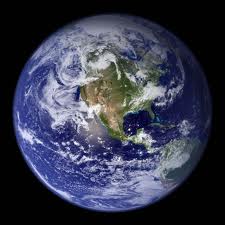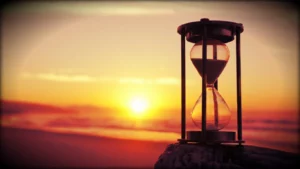Lately I’ve been thinking a lot about the future of humanity. Climate change, overpopulation, unending war, environmental, health, and economic disasters… it goes on and on. It seems like there are only a few ways to face it: bury your head in the sand (business as usual); party while you still can; fight the good fight (whatever that means to you); join the depressed throngs wrestling with seemingly inexplicable meaninglessness; or turn within and live positively as best you can.
But what is really going on? I’ve been thinking about that too.
Permit me to be an armchair philosopher for a bit, and let’s examine things from a larger perspective. As I discuss in my book Active Consciousness, the course of human history has been one of evolution in four interacting quadrants — in the outer world of nature, in our collective social/political culture, in our collective spiritual pursuits, and in our own personal consciousness and level of awareness. Much of this is discussed in the writings of people like Ken Wilber and, as discussed in a previous newsletter, philosopher Jean Gebser.
It seems to me that a driving factor for human evolution has been our growing size. As our population has grown, our natural inclination as human animals has been to try to survive and create mechanisms for this survival. Hence our development of tools, agriculture, mechanical devices, modes of transportation, and now computers and the internet. Similarly, we have had the development of villages, towns, cities, nations, and world organizations. And hence our enlarging focus from family, to clan, to nation, to global citizenship.
The trouble is that our innate human dissatisfaction, which has driven us to create more and more, never seems to be satisfied. Buddhist wisdom tells us that this is because we are trying to derive our happiness from external things, rather from internal wisdom and awareness. I certainly agree. That too, is a key message of Active Consciousness.
But it is also true that without our innate tendency toward dissatisfaction, we would probably have never made it this far! So how can we learn to know when we have enough? As we all know, even the mega rich are always yearning for more — fancier jets, bigger mansions. There is never enough, because just trying to have more things, beyond a certain point of comfort and necessity, does not quench our innate dissatisfaction. In order to do that, we must turn within.
So where are we now? Where does humanity stand in 2013?
Looking in the large, we see that we are still largely focused on creating more and more things. We are like dogs who gobble and gobble and don’t know when to stop eating. In the end, we will just kill ourselves this way. We create genetically modified organisms (Why? Because we can? Because it makes certain companies and people rich?) and we end up destroying our food supply with overuse of pesticides and foods that cause disease. We are also still focused on feeding our insatiable need for more stuff (often made out of plastic that we usually just throw out), as well as so many other unnecessary disposable luxuries. As a result, we are turning our beautiful planet into a garbage dump with huge dead zones in the oceans, polluted air to breathe, and radiation that will last for eons. Let’s face it: we are like dogs that poop in their own kennel, and the truth is, we really don’t know any better! Doing these things seems to be the natural result of our current state of evolution.
There seem to be only a few ways forward, and we now see some of these paths being explored and expanded. Some are positive, some not so much.
- Develop more energy to support the existing and still growing population. On the negative side — we are seeing more oil and gas drilling and extraction. On the iffy side — there’s nuclear energy (probably not a good idea). On the positive side — we are trying to convert to wind, solar, wave, hydro — i.e., clean, sustainable energy. On the less likely but possible side — development of zero-point “free” energies that some say will occur with the aid of alien off-planet cultures. (But what would be the consequences of that?)
- Population stabilization/reduction. This can happen in positive ways or negative ways, but ultimately, it’s going to happen. For example: via increased disease, warfare, and famine (not so pleasant); via increases in and acceptance of homosexuality (quite positive in my view); via efforts to reduce the birth rate through education (positive) or governmental control (not so pleasant). There are even signs that human fertility is naturally decreasing as well.
- Move off planet. Since our population is exceeding the Earth’s carrying capacity this is a natural response, and we are seeing growing efforts to enable commercial space travel and colonization of the Moon and Mars.
- The development of human movements promoting sustainability. These efforts include: the use of organic farming methods that don’t deplete the soil and poison our food; the move toward eating and using locally made food and products that don’t require expensive transport from across the planet; the use of sustainable energy like electricity generated from solar and wind, and stopping the use of fossil fuels; limiting ourselves to a maximum of one or two children per family; acceptance of homosexuality; models of governance based on cooperative agreement rather than on warfare in order to grab other people’s resources.
- The evolution of a human consciousness that focuses within for satisfaction. This is certainly one of my aims in writing Active Consciousness. Ultimately, this kind of evolution can help us achieve many of the above strategies, by helping to quench our need for more and more things — especially, more than we really need.
By viewing the current state of humanity in this way — in the large — we can see that we are currently in a process of evolution. And we seem to be at a critical juncture, not only because of the possible disastrous consequences of climate change, but because our innate nature, which has supported and sustained us for so long, is now bumping up against the natural boundaries of our planet.
But we may also be exactly where we need to be. Where we stand is obviously the natural consequence of our past evolution. As I suggest in Active Consciousness, we now need to collectively make decisions that support our continued existence and development. In the words of my own method for utilizing Active Consciousness, we need look within and “CHOOSE JOY”.
As Ken Wilber has suggested, humanity has always tended to evolve, not devolve. So perhaps, the odds are in our favor. In the meantime, it will be quite interesting to see what happens next!




